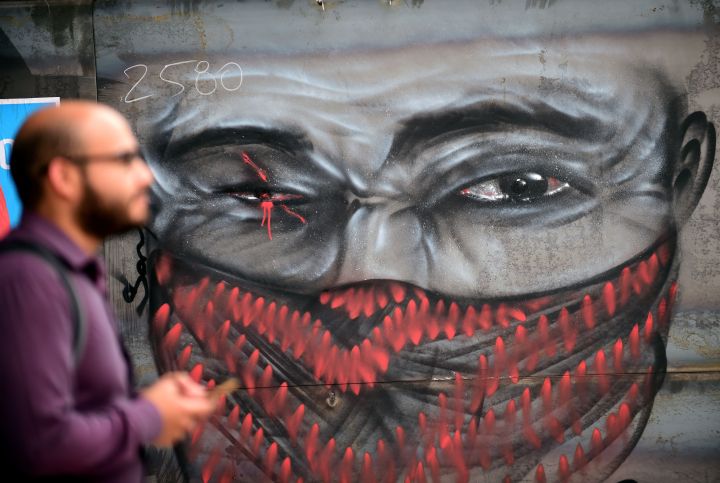
What unites the global protesters
Share Now on:
What unites the global protesters

Protests are raging around the world. While the demands are all different, there are also many common themes.
Here are the views of four people living in very different circumstances in three corners of the globe.
Hong Kong
It used to be the color of your ribbon that defined you.
When the pro-democracy protests known as the Umbrella Movement began in 2014, people divided themselves into three camps.
If you wore blue, you supported the Hong Kong government, while pro-democracy supporters became known as “yellow ribbons.”
Red ribbons symbolize support for mainland China’s opposition to the protests.

26-year-old Sher, who did not provide her last name because she did not want to be identified, said she wears her yellow ribbon with pride.
But in today’s world, masks are more common than ribbons as confrontations between protesters and police become increasingly violent.
While Sher, who is a student and part-time tutor, has never resorted to violence, she spends a lot of her time helping other protesters.

“I’ve got some students who were forced to leave home by their parents because they’ve got really different political views. And so I let them stay at my place and offer them food and Wi-Fi because they still have to connect to the world.”
Protesters have made five demands of the Hong Kong government, including universal suffrage and an inquiry into police actions.
While the high cost of living has been blamed for fueling the protests, Sher said a foot on the housing ladder will do nothing to quell protester anger.
“None of the five demands talk about money. We are not talking about housing programs or unemployment issues. We are fighting for our freedom.”

The protests have also caused a rift in Sher’s family. She described her dad as “a red ribbon.” Her mom Stella is more supportive, though she worries about Sher and her brother’s safety.
“I’ve asked them: don’t stay alone at the streets. Life is more important than everything.”
Listen to Sher’s story and the concerns of her mom.
Chile
They called it the Chilean miracle.
The economic reforms and wave of privatizations introduced by President Augusto Pinochet in the 1980s have been credited with reducing poverty and boosting growth.

Between 2000 and 2017, the number of people living on less than $4 per day fell from 31% to 6.4%.
But there were also large social costs.
Chile ranks as one of the most unequal countries among the 36 members of the Organization for Economic Co-operation and Development.

Felipe Hurtado, a 32-year-old filmmaker who lives in the capital, Santiago, said a widening gap between the rich and poor turned anger over an increase in subway fares into the worst civil unrest for decades.
Felipe says Chile is a country where money talks. “The public health system is ridiculous, because people are waiting for two months, eight months, two years for an operation [but] if you have money, you can get anything on the same day. How can be that be possible?”
In response, President Sebastián Piñera has promised to increase pension payments, cut medicine costs for the poor and raise the minimum wage.
The protests have also inspired another revolution — in art. Felipe said many of their demands are sprayed across Santiago.

“The walls of Santiago are now a blackboard of the new ideas that people are demanding from the government.”
While stores have been burned and looted and churches destroyed, Felipe said the protests have also united people.
“When I take pictures I see partnerships between the people. [But also] the devastation of a system that was very blind and very selfish.”
Iraq
Art has also become a form of protest in Iraq.
Israa Saadi Al Jabouri often goes out with her friends to paint the walls of Baghdad.

The 19-year-old was born in the Iraqi capital, but she said her prospects are grim.
“When we graduate from college after like 16 years of studying and giving our souls into this studying, we have no job. My sister graduated 10 years ago and until now she hasn’t found a job.”
Anti-government protests in Iraq began this October amid high unemployment and anger about corruption and poor public services.

Israa said she has little to lose.
“We are the generation of the nineties and the 2000s. We have suffered from many things — the bombs, ISIS — so we are not afraid of that.”
“I have read a quote one day. It says: ‘Be afraid and do it anyway.’ I’m not afraid and I’m going to do it anyway.”
There’s a lot happening in the world. Through it all, Marketplace is here for you.
You rely on Marketplace to break down the world’s events and tell you how it affects you in a fact-based, approachable way. We rely on your financial support to keep making that possible.
Your donation today powers the independent journalism that you rely on. For just $5/month, you can help sustain Marketplace so we can keep reporting on the things that matter to you.


















